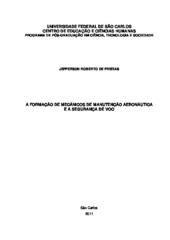| dc.contributor.author | Freitas, Jefferson Roberto de | |
| dc.date.accessioned | 2016-06-02T19:16:27Z | |
| dc.date.available | 2011-03-22 | |
| dc.date.available | 2016-06-02T19:16:27Z | |
| dc.date.issued | 2011-02-17 | |
| dc.identifier.citation | FREITAS, Jefferson Roberto de. The graduation of airplane maintenance mechanics and the flight safety. 2011. 127 f. Dissertação (Mestrado em Multidisciplinar) - Universidade Federal de São Carlos, São Carlos, 2011. | por |
| dc.identifier.uri | https://repositorio.ufscar.br/handle/ufscar/1057 | |
| dc.description.abstract | The airline industry worldwide has brought great benefits to society, affecting the economic, social and environmental sustainability, including the most diverse and cultural people around the world. This has been reflected by the increased new aircraft sales each year, and the flight safety is one of the most important and challenging factors to achieve and keep the trust of the users and the perpetuity of this transport. The flight safety is associated with both aircraft manufacturing and maintenance, where the maintenance technician plays a key role. Training and upgrading of the professional regulation and education involve theoretical and practical knowledge, which should be given special attention to human factors and ways to prevent human errors for incidents and accidents in aviation. Despite its importance, this issue has not been investigated like it would be, especially in Brazil. The objective of this research is to analyze the current situation of aircraft maintenance mechanics training with emphasis on flight safety, using an exploratory method. The results point to an increased trend of incidents and accidents in this transport sector, including the factors associated with human failings; and to the relevance of place greater emphasis on flight safety into Brazilian regulations that standardize the graduation of airplane maintenance mechanics. It has been also recommended that the curriculum and other requirements for such training be compatible with the technological innovation speed for new and old airplanes. Increased collaboration between companies and schools can also bring benefits and the regional maintenance center of Sao Carlos, Araraquara and Ribeirao Preto has potential for that. It is also suggested that such revision on the Brazilian national regulations has as reference some consultations with people involved on this market, taking into account relevant international regulations. | eng |
| dc.format | application/pdf | por |
| dc.language | por | por |
| dc.publisher | Universidade Federal de São Carlos | por |
| dc.rights | Acesso Aberto | por |
| dc.subject | Desenvolvimento social - ciência, tecnologia e sociedade | por |
| dc.subject | Segurança de voo | por |
| dc.subject | Formação e treinamento em manutenção aeronáutica | por |
| dc.subject | Manutenção aeronáutica | por |
| dc.subject | Ciência, tecnologia e sociedade | por |
| dc.subject | Aviation maintenance | eng |
| dc.subject | Flight safety | eng |
| dc.subject | Aviation maintenance training | eng |
| dc.subject | Science, technology and society | eng |
| dc.title | A formação de mecânicos de manutenção aeronáutica e a segurança de voo | por |
| dc.title.alternative | The graduation of airplane maintenance mechanics and the flight safety | eng |
| dc.type | Dissertação | por |
| dc.contributor.advisor1 | Gregolin, José Angelo Rodrigues | |
| dc.contributor.advisor1Lattes | http://lattes.cnpq.br/7842651773105125 | por |
| dc.description.resumo | O setor de transporte aéreo mundial tem trazido grandes benefícios à sociedade, afetando a sustentabilidade econômica, social e ambiental, inclusive influenciando culturalmente os mais diversos povos ao redor do mundo. Isso reflete no grande aumento de novas aeronaves vendidas a cada ano, e a segurança de voo é um dos fatores mais importantes e desafiadores para se obter e manter a confiança dos usuários e a perpetuidade desse transporte. A segurança de voo está associada tanto à fabricação como à manutenção de aeronaves, onde o profissional de manutenção aeronáutica desempenha papel chave. A formação e atualização desse profissional envolvem regulamentação e ensino de conhecimentos teóricos e práticos que devem dar atenção especial aos fatores humanos e a forma de se evitar erros humanos na ocorrência de incidentes e acidentes aéreos. Apesar da importância, essa temática tem sido pouco pesquisada, sobretudo no Brasil. O objetivo da presente pesquisa é analisar a situação atual da formação de mecânicos de manutenção aeronáutica com ênfase na segurança de voo através do método exploratório. Os resultados obtidos apontam para a tendência de aumento de incidentes e acidentes aéreos, inclusive os associados a fatores e erros humanos; e a pertinência de se incluir maior ênfase na segurança de voo na regulamentação aeronáutica nacional da formação destes mecânicos. Também é recomendável que a grade curricular e os demais requisitos para essa formação acompanhem a dinâmica das inovações tecnológicas das aeronaves novas e antigas. A intensificação da colaboração entre empresas e escolas podem também ser benéfica e o pólo regional de São Carlos, Araraquara e Ribeirão Preto tem potencial para isso. Recomenda-se, ainda, que haja revisão dos regulamentos brasileiros com base em consultas aos envolvidos, levando em conta também os regulamentos internacionais relevantes. | por |
| dc.publisher.country | BR | por |
| dc.publisher.initials | UFSCar | por |
| dc.publisher.program | Programa de Pós-Graduação em Ciência, Tecnologia e Sociedade - PPGCTS | por |
| dc.subject.cnpq | CIENCIAS SOCIAIS APLICADAS | por |
| dc.contributor.authorlattes | http://lattes.cnpq.br/4551899463699350 | por |
